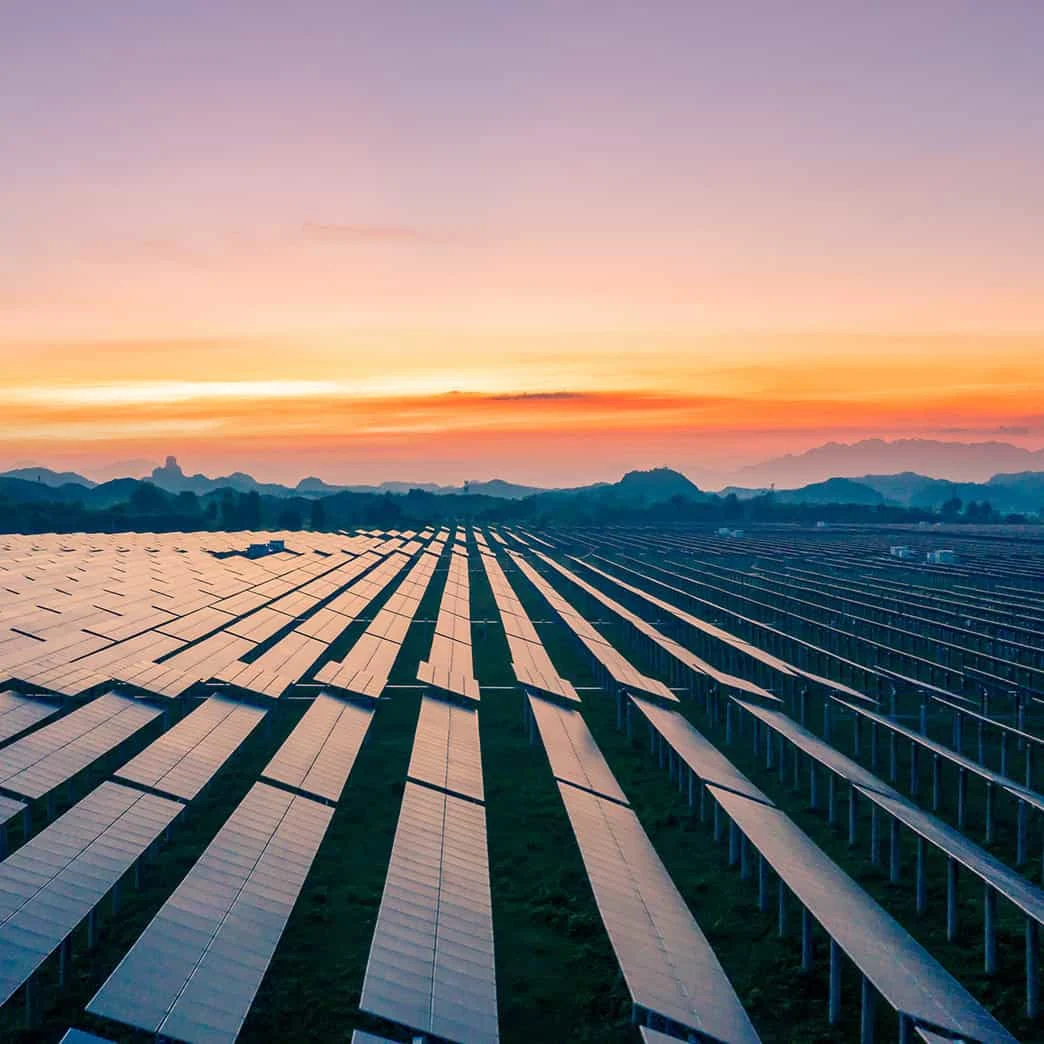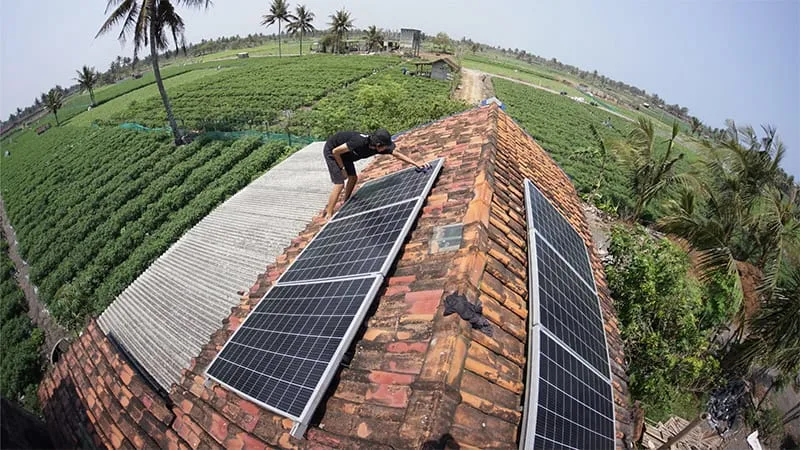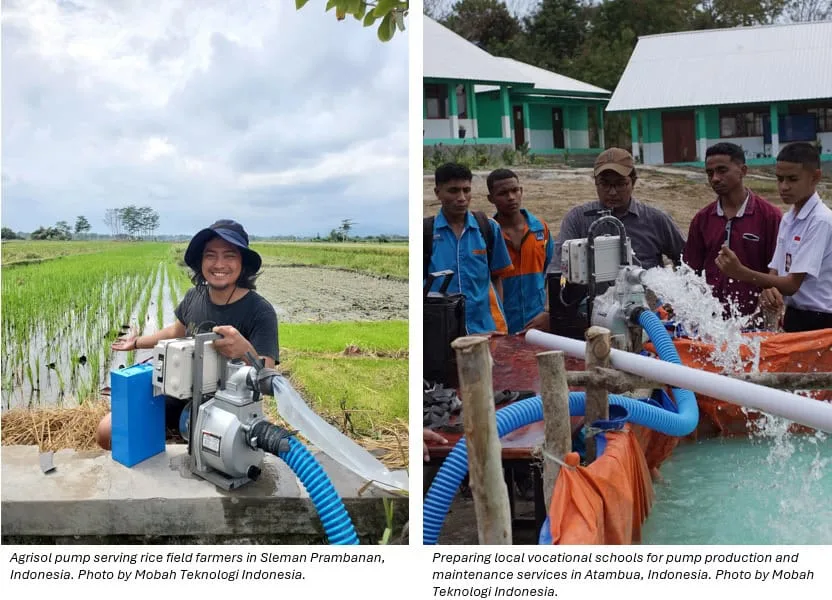2025 Winner Agrisol
2025 Renewable Transformation Challenge prize awarded to Agrisol, enabling rural agriculture powered by solar energy

In many parts of Indonesia, agriculture remains vulnerable to the whims of the weather – this is especially true for smallholder farmers who rely solely on unpredictable rainfall. Affordable irrigation is vital to sustain successful planting seasons – without it, entire seasons can be lost during the dry months. Farmers are often forced to wait for rain or use expensive petrol-powered irrigation pumps that are also noisy and harmful to the environment, and most significantly, often push farmers into debt. In some seasons, the cost of petrol is so high that letting crops fail is the only option.
Solar-powered irrigation systems are a sustainable and affordable alternative to traditional fossil-fuel-powered pumps, providing reliable access to clean water at a fraction of the cost. Agrisol, built by Mobah Teknologi, is an irrigation system built on social and technological innovation. A portable water pump, the Agrisol-pump, is powered by solar-charged batteries and designed specifically for use on small farms. Batteries are housed in a “battery swap station” and charged through rooftop solar panels that are shared between communities.

Solar-charged and community-shared battery swap station placed near farmlands in Kulon Progo, Indonesia. Photo by Mobah Teknologi, SolarGenerationID and EnterNusantara Team.
Farmers using Agrisol’s system get fuel-free irrigation up to 500 liters per minute, saving as much as IDR 2.1 million (approx. US$125) every month on potential fuel costs. Alongside the financial savings to each farmer, every unit benefits the environment by eliminating about 210 liters of gasoline used monthly, reducing carbon emissions by over 480 kg of CO2 per year.
Benefits go beyond cost savings. For traditionally rain-fed agriculture, the new system enables farmers to plant more frequently, even during the dry seasons. With one or two additional harvest cycles every year, farmers produce more food and more income. For families who have long faced the uncertainties of weather and fuel prices, this brings greater stability and security.

It’s not only individual farmers and their families that reap the rewards from the Agrisol irrigation system – scaling the program can meet a community’s current and future needs. By partnering with local vocational schools for the construction and maintenance of pumps, the program creates job opportunities, builds technical capacity and establishes long-term support networks within the community.
By including ever more farmers, the needs of communities are monitored in real-time. Farmers participate in field trials and help adapt the system design in response to changing conditions. Through this consultative approach, Agrisol by Mobah Teknologi embodies its mission: to empower farmers with energy independence, increase their harvests, and reduce poverty—while fighting climate change from the ground up.
To date, Mobah Teknologi has set up 10 irrigation systems, enabling 10 selected farmers to use Agrisol-pumps across six harvest cycles. Early pilots are running in Yogyakarta and Tasikmalaya on Java and in East Nusa Tenggara and providing promising results for scaling up the program.
Winning the Renewable Transformation Challenge is more than just recognition—it’s a powerful validation of our belief that farmers deserve clean, accessible technology that helps them build sustainable and prosperous livelihoods. This award fuels our mission to empower rural communities with renewable solutions that don’t just reduce emissions, but increase harvests, income and self-reliance.
– Roshady Said, Founder of Agrisol by Mobah Teknologi
Using the €20,000 prize from the Renewable Transformation Challenge, Agrisol intends to implement its five-year roadmap and scale up across Indonesia by:
Deploying over 3,000 Agrisol-pump units
Supporting over 1,000 farmers
Enable the reduction of over more than 2,000 tons of CO2 per year
The Renewable Transformation Challenge, launched in 2017, aims to honor and showcase outstanding work that actively supports the transformation to a world powered by renewable energy and has potential to widen access to energy, particularly in developing countries. The challenge was open to individuals and organizations in both not-for-profit and commercial sectors worldwide. Over 152 entries were received which were scored in terms of applicability, impact, sustainability and scalability in two stages: first by the Juror Panel, and then by the Elsevier-ISES Awards Committee who selected the final winner from the ten shortlisted candidates.
It was a very difficult decision this year, as we received many excellent submissions. Agrisol has impressively demonstrated how solar technology stands out in terms of cost-effectiveness, environmental friendliness and social compatibility, also for applications that have received only little attention to date.
– Prof. Klaus Vajen, head of the common awards committee
A representative from Agrisol has been invited to present on their project at the Solar World Congress 2025, held 04-07 November in Fortaleza, Brazil.
Top 10 Entries
The following entries to the Renewable Transformation Challenge were selected as the top 10 (in alphabetical order):
Agrisol: Rural Agriculture Powered by Solar Energy– Indonesia
Agrisol is a decentralized renewable energy solution for rural agriculture, built to replace fossil-fuel-powered tools with affordable solar alternatives. It introduces a two-part system: A solar-charged battery swap station located in farming areas. Solar-powered agriculture tools Agrisol-pump, a portable solar water pump operated by the batteries from the station. For many farmers in Indonesia, the cost of petrol-based agriculture tools such as irrigation pump is so high that letting crops fail is sometimes the only choice. Agrisol-pump enables farmers to significantly reduce their production costs while eliminating the need for petrol and reducing carbon emissions. By collaborating with vocational schools for production and maintenance, Agrisol also builds local skills and service capacity. laying the groundwork for both sustainability and local empowerment.
BIOGREENFINERY – Spain
BIOGREENFINERY is a pilot renewable-fuel facility at ITC in the island of Gran Canaria integrating a hybrid off-grid microgrid (solar, wind, battery, biodiesel backup) with PEM and alkaline electrolysis, nitrogen generation, and a Haber–Bosch reactor to produce green hydrogen and ammonia. It fuels a hydrogen-fuel-cell bus and two cars, demonstrating zero-carbon transport in an isolated region. Backed by around 6 M€ from EU REACTEU and aligned with the Canary Islands’ 2040 decarbonisation target and EU Green Deal, the project validates the technical feasibility and economics of e-fuel production in remote areas. As a “e/bio fuels platform,” it enables continuous operation, data collection, and a blueprint for scaling renewable fuels in hard-to-abate sectors.
Comprehensive PV Implementation – Lebanon
This project has resulted in the installation of 130 KW for water pumping in 2 sites, nine 1.6 KW system for needy households, 140 KW for main HQ, 22 KW for a recreational site, 23 KW for a school, and 7.6 KW for an organization's branch. A total of 350KW of PV were installed and 150,000 individuals are benefitting from the installed systems which are generating more than 250 MWh annually. These have resulted in annual savings exceeding $50,000. All systems are on/off grid systems capable of independent operation and energy storage in batteries, while having the ability to feed back into the grid in case the mains electricity becomes available, and PV production exceeds the immediate needs. Local individual funding of all the implemented projects insures overall project sustainability and expandability.
GreenBox – Congo
GreenBox is a 100% solar-powered cold storage solution designed to eliminate food spoilage and post-harvest losses in developing countries, where up to 50% of horticultural produce is wasted before reaching consumers. Installed in farming groups, aggregation centers, and markets, GreenBox cold rooms enable smallholder farmers, retailers, and wholesalers to store perishable foods 24/7, extending shelf life from 2 to 21 days. The project’s primary objective is to ensure food security, increase farmer income, and reduce poverty by providing affordable, sustainable cold storage at critical points in the food chain. By preserving food quality and preventing spoilage, GreenBox helps deliver safe, nutritious food to local communities while advancing climate resilience and economic empowerment. The primary objective of GreenBox™ is to empower farming communities by reducing food spoilage.
Hybrid Solar Dryers for Resilient Food Systems – Mexico
The project develops and implements a hybrid renewable energy system for food drying in rural Zacatecas, Mexico. It integrates direct and indirect solar thermal technologies, PV-T panels, and a PV solar-powered heat pump, with optional LPG and biomass backup to ensure year-round resilience. The primary objective is to reduce post-harvest losses and fossil energy dependency by deploying a replicable, low-emission, community-based drying solution powered primarily by solar renewable energy. The project enhances food preservation, strengthens rural livelihoods, and contributes to climate resilience and sustainability in vulnerable agroecosystems.
Kokota and Njau Islet Solar Electrification Project – Tanzania
The Kokota and Njau Islet Solar Electrification Project is a flagship renewable energy initiative spearheaded by Photons Energy Limited, aimed at delivering sustainable and reliable electricity to two remote off-grid communities located on Kokota and Njau Islets in the Pemba region of Zanzibar, Tanzania. These islets are home to vibrant fishing communities who, for decades, lacked access to electricity and depended on costly and environmentally harmful energy sources such as diesel generators, kerosene lamps, and disposable batteries. The lack of reliable energy limited access to clean water, education, healthcare, and economic opportunities. The primary objective is to provide universal access to clean, affordable, and sustainable electricity to the residents of Kokota and Njau through the deployment of solar-powered mini-grid systems. This is in line with SDG 7 on clean energy for all.
Scaling Up Energy Access in Malawi with Minigrids – Ireland
The goal of the Scaling Up Energy Access in Malawi (SEAM) project is to provide accessible green energy to households and rural communities in Dedza District, Malawi. As part SHA Malawi's efforts since 2008 to develop and implement market-based green energy solutions for cooking, lighting, and ‘productive uses of energy’, the SEAM project promotes the use of interconnected ‘solar mini-grids’: off-grid, electricity generation and storage installations that provide access to reliable, renewable, clean energy for rural communities. The UN set Sustainable Development Goal (SDG) 7 to tackle the issue of 760 million people living without access to electricity, 75% of whom live in sub-Saharan Africa. Malawi is particularly burdened, with only 14% of the population having access to National Grid electricity. Rural access to electricity is even lower, sitting at a mere 1% despite 85% of the country’s population living in rural areas. Expansion of the National Grid is forecasted to be more than 20 years away for a significant proportion of Malawi’s rural population. This ongoing lack of access to electricity severely affects quality of life and stalls economic development meaning alternative energy solutions are needed now.
Solar-Powered Battery Swapping for Urban Mobility – Pakistan
This project demonstrates the deployment and evaluation of Pakistan’s first decentralized, solar-powered battery swapping infrastructure for electric three-wheelers (e3Ws). The project is implemented in Multan, a secondary city with high vehicular pollution and limited mass transit, using a mobility model powered by renewable energy. 20 swappable battery-based e3Ws and 2 Battery Swapping Stations (BSSs) were launched. One BSS was powered by a 20 kWp solar PV hybrid system. The objective was to analyze the technical, economic, and social viability of powering last-mile urban mobility using renewable energy. The project reduced vehicular CO emissions by up to 70%, improved energy efficiency by 80% over oil-based 3Ws, and achieved 92% driver retention and 97% passenger preference. The project is a replicable model for climate vulnerable urban centres and leads towards sustainable mobility.
SunstorePowerpan at the Khoisan Solar Shelter - United Kingdom
The SunstorePowerpan is a hybrid solar/bio-char combined cooking and electricity generating appliance, designed to be the world's most cost effective and carbon negative feeding station for institutions and off-grid communities. It uses a modular, inverted PMMA Fresnel lens array, to concentrate up to 1kW of solar flux on to a flat plate aluminum heat pipe absorber. This energy is delivered by latent transfer, into an insulated 30 litre cooking pan. Six solar cycles per day are possible in good solar conditions when used in tandem with the solar pre-heat ‘bright’ and ‘hot’ boxes. Two linear bio-char fire-bed trays with integral bread oven, allow the unit to operate during monsoon and at night, co-generating electricity using thermo-electric diodes. The primary fuel supply strategy for the fire bed tray is to ‘pyroform’ local carbon-based waste streams (crop stalks/invasive species etc) into smokeless bio-char. This is done using a simple double barrel pyrolysis unit. The two linear fire trays can process 30 litres of food overnight while co-generating electricity for direct illumination and/or device charging, without the need for battery storage. The primary aim of the project at this stage of development, is to deploy the Sunstore Powerpan in various communities and refugee camps in Africa and produce a solar energy showcase for the Khoisan peoples.
Turning Waste to Clean Cooking Energy – Tanzania
Bantu Technologies is transforming biomass waste into clean, affordable cooking energy through biomass briquettes and stoves. Based in Zanzibar, our project tackles deforestation, waste pollution, and energy poverty by replacing charcoal with briquettes made from bagasse and other organic waste. Our primary objective is to accelerate the transition to renewable energy for cooking in underserved communities while promoting circular economy principles. With over 20% monthly user growth and positive trial results, we are scaling a low-cost, locally sourced, and climate-friendly solution that advances energy access, environmental protection, and community resilience.